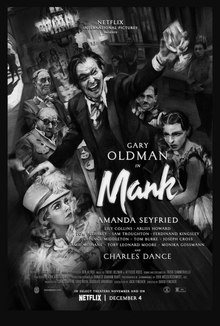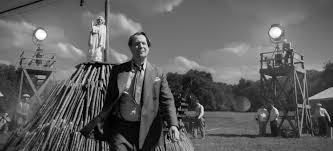|
“Mank” stars Gary Oldman, Amanda Seyfried, Lily Collins, and Charles Dance. Released in theaters on November 13, 2020, followed by a Netflix release on December 4, 2020, the film is about a screenwriter who attempts to write the screenplay for “Citizen Kane”. The film is directed by David Fincher, who also directed films such as “Seven”, “Fight Club”, “The Social Network”, and “Gone Girl”. In order to find out why a specific film became iconic in the first place, we must take a look at its origins. Making a movie isn’t always easy as people have to deal with plenty of issues such as creative differences and incidents that involve stunts and sets, which is something that I eventually learned while studying the art of film. There were some films that became massive failures because of those issues, but there were also films that became successful, if not classics, because of them. One of the prime examples of the latter is Orson Welles’ 1941 masterpiece, “Citizen Kane”. It was hailed by audiences and film enthusiasts as one of the greatest movies of all time, but the journey towards its success isn’t without its share of controversy, most particularly the authorship of its screenplay. In addition to directing, producing, and starring in “Citizen Kane”, Welles was also responsible for writing its screenplay, but not without the assistance of screenwriter Herman J. Mankiewicz, who was hired to rework and revise some parts of Welles’ script. The main part of this controversy was Welles not giving Mankiewicz credit for his work. He eventually did so, but the process in doing so was quite a trip. There have been many interpretations of this troubling production in terms of films and books, including the documentary “The Battle Over Citizen Kane”, but this film, in particular, happens to focus mainly on Mankiewicz during this journey. This latest biographical drama sees David Fincher returning to the director’s chair after a six-year hiatus to bring the screenwriter’s story to life. The film was written by David’s late father, Jack Fincher, back in the 1990s with the intention of them filming it after the completion of “The Game”, but it never came to be, and Jack passed away in 2003 after his battle with cancer. The script went unproduced until 2019 when David decided to finish what his father started. It finally made its way to theaters last month and has gained some strong reviews in the process, resulting in it being another possible Oscar contender. This weekend sees its streaming debut on Netflix, and seeing that I am a big movie buff and have viewed “Citizen Kane” during film class back in college, this was something that I wasn’t going to ignore. Was it just as captivating as its behind-the-scenes story? Let’s travel back in time and find out. Set in the 1940s, the film tells the tale of Herman J. Mankiewicz (Oldman), an alcoholic screenwriter who was hired by Orson Welles (Tom Burke) to help him write the script for his film “Citizen Kane”. During that time, a series of flashbacks were shown depicting the events Herman experienced during his time in 1930s Hollywood, such as his relationships with William Randolph Hearst (Dance) and Marion Davies (Seyfried). What I enjoy the most from these types of films is the “behind-the-scenes” aspect, in which they examine the people that were responsible for a specific project and how they’re inspired to do the impossible. It's such an interesting way to see what happened behind some of our favorite films. It worked extremely well for films like “The Disaster Artist”, and unsurprisingly, it also worked for “Mank”. “Mank” examines Mankiewicz’s attempt to write a great script with a healthy amount of style and wit in David Fincher’s direction and Jack Fincher’s screenplay. While it came close to being a masterpiece when it comes to its narrative, the film still delivered a compelling and well-executed Hollywood story that should impress plenty of film buffs. One of the main highlights of the film would have to be the technical artistry. Shot in gorgeous black and white by Erik Messerschmidt, the film brilliantly recaptured the look and feel of an actual black-and-white film from the 1930s. What made it even more authentic was its accurate production design, the stunning costumes, its upbeat score by Trent Reznor and Atticus Ross, and the sound mixing. It gives you this unique feeling of actually watching a black-and-white film in the 30s. David Fincher has been known for helming films that are down-to-earth, dark, and bleak, including “Fight Club” and “Gone Girl”. “Mank” is something that lies outside of the director’s usual approach because of its tone. Thankfully, it didn’t feel too out-of-place as Fincher was able to provide a sense of charm and majesty in its compelling, yet slow, dialogue-driven sequences. Another highlight for me was the cast. They were top-notch from start to finish, especially the great Gary Oldman, who completely mastered the witty persona of the title character. He didn’t match his career-best performance in “Darkest Hour” in my opinion, but his performance as Mankiewicz still proves that Oldman has the right talent to lose himself in these types of roles. Amanda Seyfried and Lily Collins were also great in their roles as Marion Davies and Rita Alexander (Herman’s secretary) respectively. As I mentioned before, the film fell a bit short of being a straight-up masterpiece because of its narrative. Not that there’s anything wrong with it since the story has a lot of really good moments, including its political elements. It’s the fact that there were some scenes that either dragged a bit or were a tad underwhelming. Other than that, the story has enough material to make this intriguing concept work. Overall, “Mank” is an artistic marvel that serves as both a tribute to classic filmmaking and as an engaging character study of the screenwriter behind the timeless classic. While far from a perfect film, this is another impressive piece of cinematic art from David Fincher thanks to its talented cast, its suitable script, and its incredible technical aspects. I can already imagine Jack Fincher smiling down at his son from above the clouds for finally bringing his script to life onscreen. If you’re one of the people that enjoy watching classic films from the 30s and 40s, I believe that you’re going to get a kick out of this one. B+
0 Comments
Leave a Reply. |
Home of the most friendly movie reviews on the planet.
Categories
All
Follow Me |
- Home
- Classic Reviews
- 2015 Reviews
- 2016 Reviews
- 2017 Reviews
- 2018 Reviews
- 2019 Reviews
- 2020 Reviews
- 2021 Reviews
- 2022 Reviews
- 2023 Reviews
- 2024 Reviews
- Movie Talk
-
Fan Fictions
-
Ed, Edd n Eddy: The Ultimate Ed-Chronicles
>
-
The 'Beginnings' Saga
>
- Ed, Edd n Eddy: The Rise of Maleficent >
- Transformers: Legend of the Black Cauldron >
- Ed, Edd n Eddy meets the Penguins of Madagascar >
- The Eds and Iron Man: Dawn of the Blowhole >
- Ed, Edd n Eddy: The Fast and the Furious >
- The Eds and Kung Fu Panda: Battle for China >
- Ed, Edd n Eddy and the Lion King: The Full Circle >
- Ed, Edd n Eddy meets Thumbelina: Revenge of the Shredder >
- Ed, Edd n Eddy: Journey to Neverland >
- Ed, Edd n Eddy: All Tangled Up >
- Ed, Edd n Eddy's Frozen Adventure >
- Ed, Edd n Eddy's Edventures in San Fransokyo
- Ed, Edd n Eddy: Return to Neverland
- Ed, Edd n Eddy vs The League of Evil
-
The 'Avengers' Saga
>
- The Eds and the Little Mermaid: Age of Extinction
- Ed, Edd n Eddy meets the Ghostbusters
- Ed, Edd n Eddy: A Sea of Adventure
- Ed, Edd n Eddy meets Anastasia
- Ed, Edd n Eddy in Who Framed Roger Rabbit?
- Ed, Edd n Eddy meets the Incredibles
- Ed, Edd n Eddy and the Lion King 2: Simba's Pride
- Ed, Edd n Eddy: Brand New Zootopia
- Ed, Edd n Eddy: Into the Sugar Rush
- Ed, Edd n Eddy and the Big Sea Quest
- Ed, Edd n Eddy: Heroes Assemble
- Fastformers: Rio Heist
- The Loud Ghostbusters >
-
The 'Beginnings' Saga
>
-
Ed, Edd n Eddy: The Ultimate Ed-Chronicles
>
- Contact
- About


